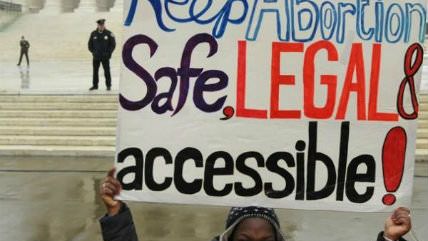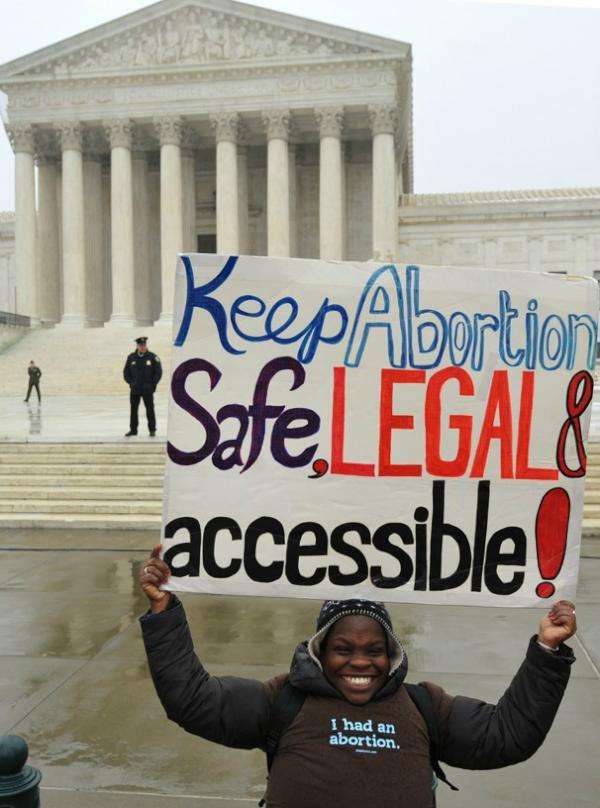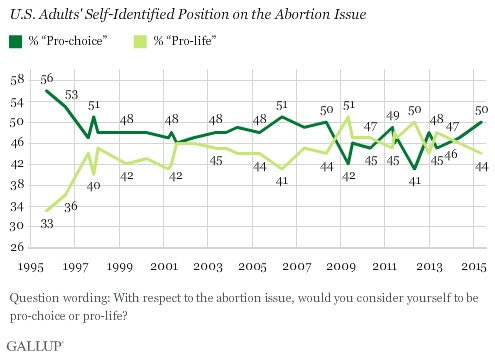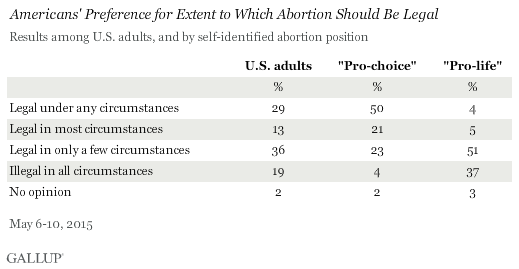Americans Getting Increasingly Pro-Choice on Abortion
'Pro-choice' identification is back up to late 1990s levels.


"Is the ground shifting under abortion?" asked The Christian Science Monitor yesterday. Indeed, there's growing evidence that Americans' abortion views are swinging more pro-choice these days. In the latest Gallup poll, released May 29, half Americans identified as "pro-choice" on abortion, compared to 44 percent who identified with the label "pro-life."
The prevailing narrative in the media, particularly conservative media, still seems to be that Americans—and especially young Americans—are trending more pro-life. But millennials tend to reject labels like pro-life and pro-choice, or say that both describe them equally well, reflecting a perhaps confused, perhaps more nuanced, or perhaps still developing sense on the issue. A Vox poll about abortion earlier this year found 18 percent of Americans of all age describe themselves as "both" pro-life and pro-choice, and 21 percent say "neither." More generally, "Americans have been fairly evenly divided in their association with the two abortion labels" over the past five years, states Gallup.
Throughout the '90s and first decade of this century, the pro-choice position almost always led by a substantial margin, though it did decline from 56 percent support in 1995 to 48 percent in 1999 and throughout the early aughts.

"While Gallup does not define the pro-choice and pro-life terms for Americans, [respondents] answers to a separate question about the legality of abortion indicate that those favoring the pro-choice label generally support broad abortion rights, while pro-life adherents mostly favor limited or no abortion rights," notes the organization. Half of self-identified pro-choicers say abortion should be "legal under any circumstances," while 21 percent say it should be legal in "most" circumstances and 23 percent say it should be legal "in only a few circumstances." On the pro-life side, 37 percent say it should be illegal in all circumstances, 51 percent say it should be legal in a few circumstances and 5 percent say it should be legal in most circumstances.

Notably, a slight gender gap on abortion has emerged, breaking from earlier trends of equally pro-life and pro-life positions among men and women. In Gallup's latest poll, 54 percent of women identified as pro-choice, compared to only 46 percent of men. This is the highest percentage of pro-choice women seen since before 2001.
Young people's embrace of the pro-choice label, at 53 percent, is back to the numbers seen in the early 2000s, after dips into the 40s in 2009-2012. And 52 percent of 35- to 55-year-olds now say they're pro-choice (up from 47 percent in 2001 and 44 percent in 2009), as do 47 percent of those 55 and up (up from 40 percent in 2001 and 38 percent in 2009).
The increase in pro-choicers is largely attributable to people who identify as Democrats, while Republican and independent identification as pro-choice has remained relatively stable over the past 15 years. In the latest poll, 31 percent of Republicans, 50 percent of independents, and 68 percent of Democrats identified as pro-choice.
Lest the Gallup poll be seen as something of an anomaly, recent data from Pew Research Center found similar numbers, with 51 percent of Americans saying abortion should be legal in most or all cases, compared to 43 percent who said it should always or mostly be illegal. "In both cases, these figures have remained relatively stable for more than 20 years," according to Pew. A 2014 poll conducted by NARAL Pro-Choice America found 23 percent of U.S. adults surveyed think abortion is morally acceptable, and 45 percent personally oppose abotion but don't believe it should be illegal.
Another poll released by Gallup last Friday found abortion is growing in issue importance among voters; 21 percent now say they will only vote for candidates who share their beliefs about abortion, a record high in Gallup's 19 years of asking the question. This attitude might be a reaction to the record number of abortion restrictions passed at the state level in recent years, making politicians' abortion views seem more relevant. A January 2015 poll from Gallup found support for abortion policies in the U.S. at the lowest level since 2001.
As The Christian Science Monitor points out, recent decisions in federal courts have been largely unfriendly to Republican-backed abortion restrictions. Last week, the 8th Circuit Court of Appeals struck down an Arkansas law banning abortion after 12 weeks pregnancy and the 9th Circuit Court of Appeals struck down a 20-week ban in Iowa. In March, a federal judge ruled Wisconsin's law requiring abortion doctors get admitting privileges at local hospitals to be unconstitutional, and in December a federal judge struck down a similarly unnecessary clinic regulation in Indiana. And in 2014, federal courts rejected abortion restrictions in Alabama, North Carolina, Oklahoma, Mississippi, Louisiana, and Texas while the U.S. Supreme Court blocked key parts of a Texas abortion regulation.
At the same time, however, state legislatures continue to pass anti-abortion laws at an alarming rate. Last week, West Virginia became the latest state to ban abortion at 20 weeks pregnancy (after Gov. Earl Ray Tomblin vetoed the legislation in March). Wisconsin is currently considering a similar ban, with criminal penalties of $10,000 and/or a 42-month prison sentence for doctors who break the law. Oklahoma recently instituted a mandatory 72-hour waiting period between when a woman seeks an abortion and when it can be performed, and a new law in Arizona requires doctors to tell women taking the abortion pill that the procedure can be "reversed" if they act quickly.


Show Comments (79)